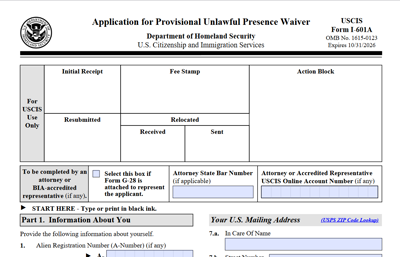In the Provisional Unlawful Presence Waiver process, the waiver, by itself, does not convey a legal status. It is a secondary benefit to a primary application that would give a non-US Citizen legal immigrant status.
The primary application is the Immigrant Visa, over which the Department of State (DOS) has jurisdiction. The Provisional waiver only addresses grounds of inadmissibility (unlawful presence) that may prevent DOS from issuing the Immigrant Visa at the time of the applicant’s interview abroad.
If USCIS approves the provisional waiver and DOS approves the Immigrant Visa, the applicant will be admitted to the United States as a Lawful Permanent Resident, subject to Customs & Border Protection (CBP) inspection and determination that he or she is otherwise admissible and entitled to the Immigrant Visa classification.
The approval of the Provisional Unlawful Presence Waiver is discretionary and does not constitute a grant of any lawful immigration status or create an authorized period of stay.
The approval of a Provisional Unlawful Presence Waiver
1. Does not create or confer a lawful immigration status.
2. Does not extend any authorized period of stay.
3. Does not protect against the accrual of additional unlawful presence.
4. Does not authorize a non-US citizen to enter the United States without securing a visa or other appropriate entry documents.
5. Does not protect a non-US citizen from being placed in removal proceedings or being removed from the United States of America.
6. Does not grant any other immigration benefits, including temporary work authorization or advanced parole.
7. Does not guarantee that an individual with an approved Immigrant Visa will be admitted to the United States of America by CBP.
USCIS Processing Time for Provisional Unlawful Presence Waiver
USCIS indicated during its January 2nd 2013, stakeholder teleconference on the Provisional Unlawful Presence Waivers final rule that no processing time has been set for adjudicating Provisional unlawful presence waiver; this will be determined by the volume of applications received and the pace at which the applications are received, starting March 4th, 2013.
USCIS Premium processing within 15 days is not available for the provisional waiver.
However, applicants can request expedited adjudication of a provisional unlawful presence waiver in accordance with current USCIS expedite guidance.
Adjustment of Status
Individuals, who are eligible to obtain Lawful Permanent Resident status, while inside the United States, through the adjustment of status process and intend to pursue Lawful Permanent Resident status through that process, do not need the Provisional Unlawful Presence Waiver. The Provisional Unlawful Presence Waiver is only valid for the purpose of seeking an Immigrant Visa outside the United States.
Interview Requirement for the Provisional Unlawful Presence Waiver
Generally, in adjudicating the Provisional Unlawful Presence Waiver application, applicants will not be required to attend an interview. However, USCIS indicated in the final rule that it reserves the authority to interview applicants and their U.S. Citizen spouse in connection with the Provisional Unlawful Presence Waiver application in the exercise of its discretion.
Approval of Immediate Relative Petition as a basis for Filing Provisional Unlawful Presence Waiver
A Provisional Unlawful Presence Waiver can only be filed after approval of the Form I-130 or Form I-360. Therefore an applicant cannot concurrently file Forms I-130/I-360 and I-601A Application for Provisional Unlawful Presence Waiver together at the same time, or file Form I-601A Application for Provisional Unlawful Presence Waiver before approval of the Form I-130 or I-360.
Extreme Hardship Waiver for Unlawful Presence
Extreme hardship is a legal requirement that an applicant must meet to qualify for the Provisional Unlawful Presence Waiver. The U.S. Immigration law does not specifically define extreme hardship.
According to the Board of Immigration Appeal (BIA), extreme hardship is not a definable term of fixed and inflexible meaning, but that the elements to establish extreme hardship are dependent upon the facts and circumstances of each case.
USCIS will look at the totality of the applicant’s circumstances and any supporting evidence to determine whether the qualifying U.S. Citizen spouse or parent will suffer extreme hardship in the event the applicant is not granted lawful Permanent Resident status.
Applicants who fail to meet the extreme hardship requirement will have their Application denied.
